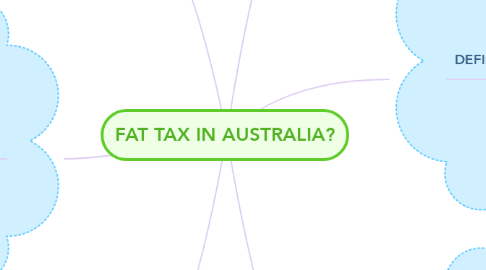FAT TAX IN AUSTRALIA?
by Taysia Snelgar


1. ARE THERE OTHER PRO ACTIVE ALTERNATIVES?
1.1. A corporate tax on profits made by the food companies that produce unhealthy products
1.2. Practical education to be strengthened in school curriculum. Free Education also made available for the general community
1.3. Better regulation of advertisng or better yet a complete ceasation as with tobacco products
1.4. Supermarkets and food outlets banned from promoting unhealthy items and meals through specials and upselling
1.5. Why is there an age requirement for buying tobacco products and alcohol but not for disease causing food products? too dramatic or does the issue call for drastic measures like this?
1.6. More clear and direct labeling of food products. Ingredients listing should be transparent and easy to understand
2. PUBLIC VIEW
2.1. People hate tax. What do people do when they dont like something? Rebel against it,
2.2. Without an extensive and educational roll out, people may have little understanding of the benefits or the purpose
2.3. Could instill a false sense of resolution in the public. People may take a less pro active approach to nutritional education and choices as will feel as though it is being '"taken care of"
2.3.1. Included
2.3.2. Included
2.3.3. Excluded
3. WHO WOULD IT HELP?
3.1. farmers, local fresh produce suppliers and independent health food brands would hopefully see an increase in demand and revenue, then in turn may be able to lower retail pricing
3.1.1. Project specifications
3.1.2. End User requirements
3.1.3. Action points sign-off
3.2. If prices for healthier foods do drop then low income families would have more freedom of choice in product selection and may be more inclined to healthy choices
3.2.1. Define actions as necessary
3.3. More children will grow up in families who don't buy unhealthy treats and meals and will develop a better understanding of nutrition and likely make better food choices later in life
4. WHO WOULDNT IT HELP?
4.1. High income earners who are un-fazed by price increase
4.2. People with food addiction which is a large percentage of our population when you take sugar addiction into consideration
4.3. the many people who are uneducated about healthy food or cooking and have to resort to taxed items due to lack of skills and knowledge with the healthier options
5. SHORT TERM OR LONG TERM SOLUTION?
5.1. Is this just reinforcing societies already detrimental mentality of using quick fixes instead of making permanent change?
5.1.1. Materials
5.1.2. Personel
5.1.3. Services
5.1.4. Duration
5.2. How will this act as a preventative measure for future generations? Will the poeople in 20 years time see a need for such a tax without having had a proper education about why food choices are important?
5.3. It may just cause further product manipulation. Similar to the surge of high sugar products introduced to the market to supplement taste in low fat products
6. DEFINE HEALTHY AND UNHEALTHY
6.1. How will the guidelines for the tax be determined? Should we trust them considering there is so much conflicting information regarding what is and isn't healthy? Some of which comes from the government
6.1.1. Dependencies
6.1.2. Milestones
6.2. Will decisions be based on a general perception of health rather than evidence based research. E.g muesli bars generally considered healthy yet often contain as much sugar as a chocolate bar.. will they be taxed?
6.2.1. Schedule
6.2.2. Budget
6.3. full fat products have been viewed as unhealthy for many years when in fact good fats that from cream, cheese, meat is essential for many functions in the body - can we trust the tax to actively encourage nutritious eating as well as discouraging bad food products?
6.3.1. KPI's
